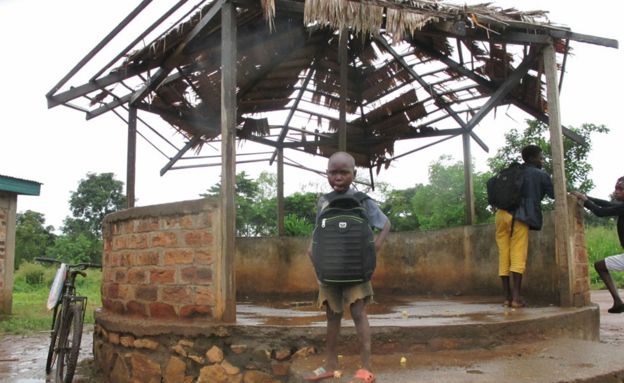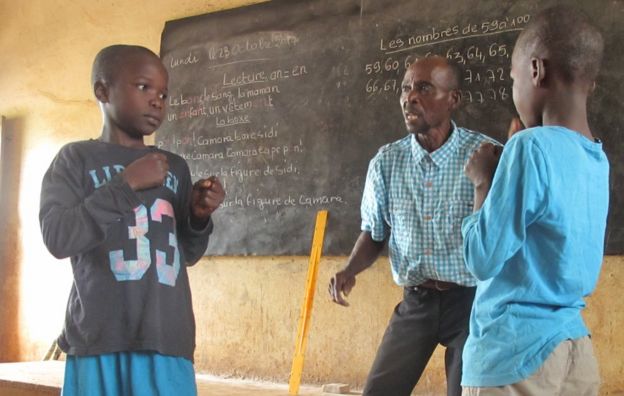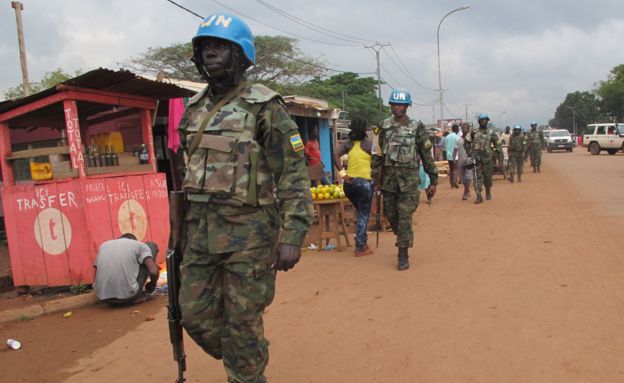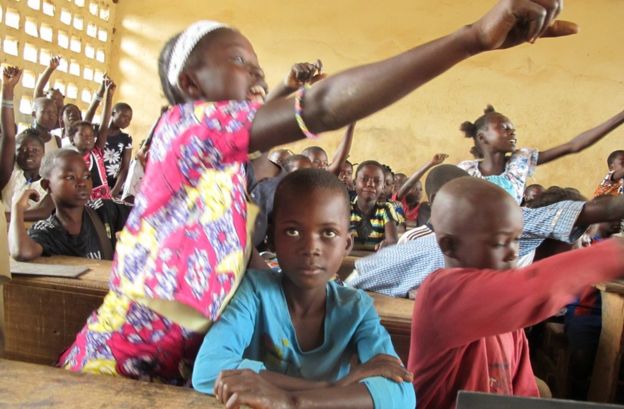
Audio By Carbonatix
Rivals have been fighting in the Central African Republic since 2013. In the chaos the school teachers have quietly disappeared so now parents are going through crash courses to replace them.
Farmer Apollinaire Zaoro knows a thing or two about planting. While his maize and cassava grow in the field, he is sowing seeds of knowledge in young minds.
The school in his village, 25km (15 miles) from the capital, has no qualified teachers. And so for the past three months, Mr Zaoro, 58, has been leading a class of 105 primary school children.
Decades of neglect compounded by four years of war have picked off most of the Central African Republic's trappings of nationhood: local government, hospitals, clinics, police stations and a national education system.
The UN says 2.3 million people - half the population - are dependent on aid.
Armed groups are fighting across 80% of the territory. They often use school buildings as base camps, playgrounds as firing ranges and turn desks and chairs into firewood.
Most qualified teachers, unable to collect their salaries because there are no banks outside the capital, have abandoned their positions.
Sleeping with snakes
For three years leading up to 2016, Mr Zaoro and the 1,000 or so residents of Yamboro regularly had to flee Seleka rebels.

Image captionAs well as teachers, CAR's schools also need a lot of rebuilding work
"We would run into the bush and hide in the trees, the shrubbery, among the snakes. It wasn't easy to find enough to eat. We have to be grateful that [their opponents] the Anti-Balaka came and chased them away. But we are still frightened," he said.
In the packed classroom, the charismatic Mr Zaoro looks like he has found his vocation. He admits he has always enjoyed acting, so he brings heaps of energy to the lesson in counting from 1 to 100.
He unrolls a poster showing all the numbers, and exclaims: "73".
He wants a child to come up and point out that number. Eager arms shoot into the air, fingers clicking for attention. And when, after a moment's suspense, 11-year-old Esther correctly points out the number, all the children quick-clap and shout "c'est super!" (that's great).
There is even more excitement during the French lesson, in which Mr Zaoro calls two boys to the blackboard and they are asked to act out a short story about a boxing match.

Image captionApollinaire Zaoro has abandoned his farm to step in for the missing teachers
The class is a heart-warming and dynamic environment in a country humanitarian workers describe as one of the most hopeless and, for them, the most dangerous in the world.
The Central African Republic was pitched into war in 2013 after President François Bozize, a Christian, was overthrown by the mainly Muslim Seleka rebels.
The Seleka were ousted by France, leading to bloody reprisals by the Anti-Balaka.
They are often described as Christian but they are a ragtag of fighters wearing amulets they believe protect them from the bullets of Kalashnikovs - called the "anti-balles-AK" in French.
Future leaders
The UN force, Minusca, essentially controls only the capital, Bangui, keeping in place the elected government of Faustin-Archange Touadera.

Image captionThe UN force only controls the capital, Bangui
In the rest of the country, the Seleka and Anti-Balaka have splintered multiple times. Groups on both sides now fight for control of road junctions and natural resources, including gold, diamonds and cattle-herding routes.
Mr Zaoro is among 500 "parent-teachers" who have received a crash course in education from a Finnish charity.
A further 8,000 parents - most of them with only the very basics of schooling themselves - have been recruited and need to be trained. But 14,000 are said to be needed.
The farmer loves his new role. "I am educating the future leaders of my country. It makes me proud and happy. I want these children to go further than I have gone in life."

Image captionThese are the lucky ones who go to school
He and three other parent-teachers at the school each receives 35,000 CFA francs ($65; £45) per month from the United Nations children's agency, Unicef, to mind four classes from 7am to 4pm every weekday.
"We do not do it for the money!" he exclaims.
"Since there are no banks and the road is dangerous, we have asked to be paid quarterly in Bangui. I am due to receive my first pay at the end of December.
"Unfortunately, due to my teaching commitments, my field is mostly overgrown now. But the other parents who are farmers help me with the work, and they give me food when they can."
Privileged few
The parent-teacher initiative is getting the country's children back to school. But it only works in villages with a strong community spirit, and it is still a far cry from the national education system the Central African Republic needs.
Yamboro's children are among the privileged few.
At Sangala 1, a village a further 70km away from Bangui, we found a deserted school building with graffiti on the walls, bullet holes in the corrugated roof, a broken borehole and a mere 17 useable chairs.
No children had turned up for class because, said village chief Gaston Mongombe, "there is no teacher and it is raining".
Unicef does not know exactly how many of the Central African Republic's children are out of school due to the teaching crisis. The figure is likely to be in the hundreds of thousands.
The conflict in Central African Republic
 Image copyrightAFP
Image copyrightAFP
- In 2013, Muslim militias called the Seleka seized power in Central African Republic
- Largely Christian fighters known as the anti-Balaka took up arms to fight back
- More than a million people have since been displaced by continued fighting, and thousands killed
- In August, the UN's aid chief said he saw "early warning signs of genocide" in Central African Republic
- About 13,000 United Nations peacekeepers are deployed in the country at a cost of nearly $900m (£686m) per year in the mission known as Minusca
Latest Stories
-
Ebo Noah remanded pending psychiatric exam, to reappear on January 15
1 minute -
Our public university system is falling down
4 minutes -
Ho Central Mosque under heavy security, worshippers forced to pray outdoors
23 minutes -
An open letter to H.E. John Dramani Mahama: The audacity of the third shift
58 minutes -
A new era of healthcare dawns in Kintampo: Mary Queen of Love Medical Hospital opens its doors
2 hours -
NDC gov’t has demonstrated strong fiscal discipline – Abdulai Alhassan
2 hours -
Heavily armed Burkinabè soldiers arrested in Ghana
2 hours -
Tamale Chief commends IGP Special Operations Team for crime reduction efforts
2 hours -
None of NPP’s 5 flagbearer aspirants is credible – Abdulai Alhassan
3 hours -
Police arrest suspect for unlawful possession and attempted sale of firearm
4 hours -
3 arrested in connection with Tema robberies
4 hours -
Your mouth on weed is nothing to smile about
4 hours -
25% university fees hike, what was the plan all along? — Kristy Sakyi queries
6 hours -
Some OMCs reduce fuel prices; petrol going for GH¢10.86, diesel GH¢11.96
6 hours -
Trump says health is ‘perfect’ amid ageing concerns
7 hours

